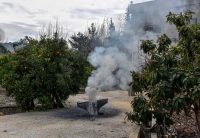
Syria: How to prevent Israel-Iran shadow war spinning out of control
The explosion of a Syrian anti-aircraft missile in southern Israel on 22 April, followed by Israeli attacks around the northern city of Latakia on 5 May, were only the latest episodes of the shadow war that Israel and Iran have been fighting in war-ravaged Syria for several years. They will not be the last.
Neither side wants these occasional flareups to grow into a fully fledged confrontation. But the risk of escalation is real due to potential miscalculations or technical errors in both sides’ attempts to achieve tactical gains.
The involvement of Hezbollah, Tehran’s most important non-state ally, in the Syrian theatre carries a further risk that comparatively low-level altercations in Syria may spill over into Lebanon and trigger a destructive conflict between the heavily armed Shia group and Israel.… Seguir leyendo »


